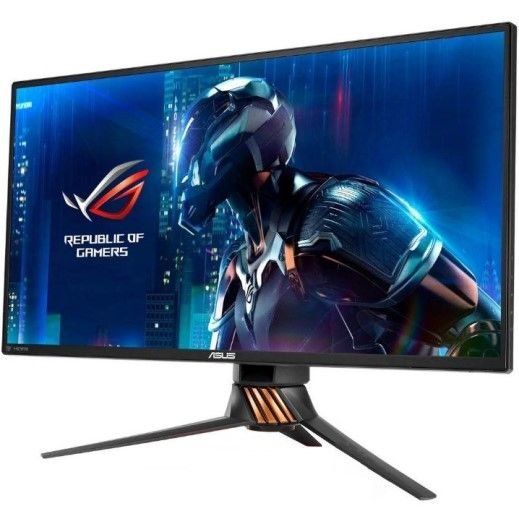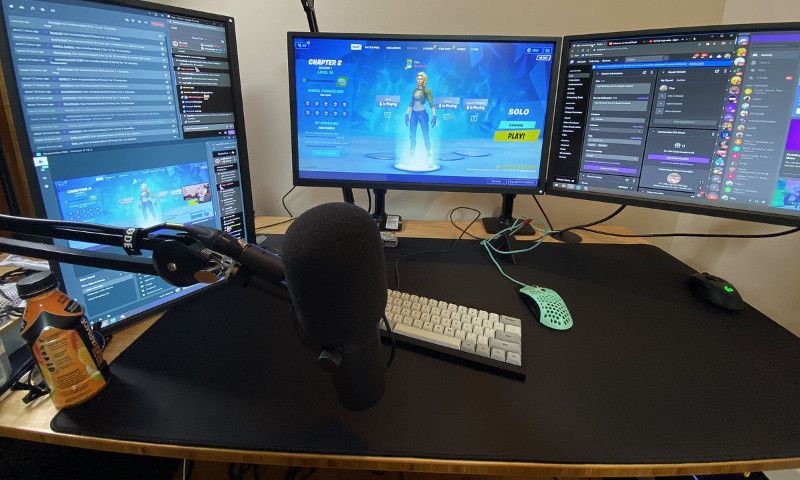Tfue’s gaming setup is obviously important to him, as he has been spending most of his free time gaming since childhood. So, we have put together a detailed list of the peripherals that make up Tfue’s gaming setup in order to give you an idea of what a top gaming and streaming setup can look like.
Tfue only started playing video games when he was around twelve or thirteen years old, and quickly became addicted to the competitive aspect of them and especially loved trying to break world records. He played a few different Battle Royale and FPS games during that time including Call of Duty and H1Z1.
He started creating Halo video content since 2014 when he was around sixteen years old. Prior to that, he had occasionally featured in his brother, Joogsquad’s, prank YouTube videos. Although he had a bit of a following, it was only when he switched over to Fortnite upon its release that his FPS skills really started being noticed by the wider Twitch community and his channel really blew up. Tfue’s channel is still continuing to grow, and he earns so much money that he even dedicated an entire YouTube video to spending $1 million USD in a day.
TFUE’S MONITOR

Tfue uses three ASUS ROG Swift PG258Q 24.5-inch monitors. The ASUS ROG Swift PG258Q has a refresh rate of 240Hz and a response time of 1ms. Although Tfue said that it’s fine to play FPS games on an 140Hz PC, he got a 240Hz for his gaming setup ‘because why not.’ So, the 240Hz refresh rate shouldn’t be the main reason for choosing this screen. The 180Hz version is $200 cheaper.
However, it does come with a TUV Rhineland-certified Blue light filter and flicker free back lighting to reduce eyestrain when using it for long periods of time. It also integrates NVIDIA G-Sync technology that is meant to eliminate screen-tearing for smoother gameplay.
TFUE’S MOUSE
Tfue mouse is a Razer Viper Ultimate wireless. The Razor Viper Ultimate comes with an RGB docking station, 8 programmable buttons and a Razer 5G 20,000 dpi optical sensor. The mouse is ambidextrous, with right- or left-hand settings in the software, and has two buttons on either side for this purpose. There are another two buttons located on the underside of the mouse, one of which controls the power, while the other toggles between the 5 DPI settings. The preset DPI settings are at 400, 800, 1800, 2400, and 3200. All of these buttons can be adjusted in the software.
The body of this 74g is constructed from plastic and has textured rubber grips on the sides to prevent your hand from slipping. But it seems to be designed for people with bigger hands, as it is 12.7cm (L) × 6-6.6cm (W) × 3.8cm (H). Its feet are constructed from PTFE-material, which is the same material that is used to coat non-stick pans in order to make sliding the mouse as effortless as possible.
The battery lasts about 70 hours. There is also a wired version that sells for ~$80 USD less.
TFUE’S MOUSEPAD
Tfue’s setup includes a SoloQ Extended Mega Size mousepad. Tfue has chosen a massive 121.9 × 61 × 0.41 cm mousepad for his gaming setup that is wide enough to set up two keyboards if you don’t have a wide swing. It has a rubber base that is designed to reduce slipping, although with its size, its unlikely that you would need this extra feature.
As for the fabric itself, this mousepad is waterproof so that spills won’t be a problem and has stitched edges to prevent fraying. It has a memory foam filling, with both the exterior and interior being washing machine friendly. However, this mousepad is meant for right-handed gamers.
TFUE’S KEYBOARD
Tfue uses an Akko x Ducky 2 Mini keyboard with ultraviolet key caps. The Akko × Ducky 2 Mini is a thick, double-layered, 61-key RB-lit keyboard that is designed to save deskspace in order to provide more freedom for mouse movements. There are Cherry MX Red (linear), Blue (loud) and Brown (tactile) versions of this keyboard, which can be easily removed and replaced with other switches.
Switches are a matter of personal preference, as some prefer resistance because they then feel confident about the feedback, while others prefer silent, highly responsive switches that will help them to retain their focus. If you’re In doubt as to the type of switch that you’d prefer, it might be best to either ask your friends if you can try out their keyboards or to go to a brick-and-mortar store to ask them if you can try out the different switches.
Another option would be to buy a switch tester, such as the Griarrac Cherry MX 9-switch tool or the Glorious MX Switch 14-switch tester. He is currently using gray and white keycaps with his gaming setup, but Tfue hasn’t specified which brand they’re from.
TFUE’S HEADSET
Tfue headphones are Sennheiser HD 800 S. The Sennheiser HD 800 S headphones are open-back, around the ear dynamic headphones with 56mm rind radiator transducers and XLR connectors. The open-back means that these headphones release some sound, making them unsuitable for use in public spaces, but help to produce a soundstage surround sound experience while also having the side benefit of reducing pressure on the eardrum.
They are designed for audio recording and playback purposes, with the driver angled in order to further pronounce the soundstage immersive. This is aided more by the high frequency response of 4 – 51,000Hz that is coupled with a 102dB SPL and an impedance of 300 Ohm.
With these specs, it’s no wonder that they sell at ~$1,600 USD. This excludes the additional expenses of a mixer. It does come with both a XLR cable, as well as a cable with a ¼ jack.
As most of its features exceed the needs of a typical fps game, it might be worth considering a cheaper option such as the Audio-Technica ATH-M50x used by TimTheTatman or the HyperX Cloud Flight that Shroud uses.
TFUE’S MICROPHONE
Tfue setup for streaming includes a Shure SM7B microphone. The Shure SM7B microphone is among the most popular microphones used by streamers, including Loeya, KingRichard and MrFreshAsian. It is a cardioid dynamic microphone with a unidirectional polar pattern that is built around a full-metal chassis to provide durability.
Spec-wise, it has an impedance of 150 Ohms, combined with a wide frequency response of 50 – 20,000 Hz and a sensitivity of – 59dB and also boasts a presence boost button and high-press filter switch. All of which serve to create an overall crisp studio-quality output.
A full list of comparisons to other popular streaming microphones can be found here, if you feel that that this contribution to Tfue’s gaming setup may be a bit beyond your budget.
TFUE’S WEBCAM
Tfue setup includes a Logitech Brio for his facecam and a Logitech C930e for his keyboard cam. The Logitech BRIO is a basic clip-on webcam that is designed for simple streaming, live-chatting and vlog-style video creation. It is more advanced than the Logitech C920 and C922s as it offers 4K Ultra HD recording quality, as well as the potential to toggle between a 65°, 78° and 90° field of vision and to zoom into an image up to 5x. Further features include autofocus and the RightLight 3 technology that automatically tweaks the lens to adjust to lighting changes.
Due to these additional features, the Logitech BRIO isn’t a simple plug-and-play, as you will need to use the software to set the recording quality according to your preferences.
The Logitech C930e is an older model that doesn’t have the 4K capabilities, a 4x zoom potential and lower audio quality. For other features, it is best to look at comparison videos on YouTube or by watching streamers who use the two models. DeadlySlob uses the C930e, for reference.
View the Logitech BRIO on Amazon
View the Logitech C930e on Amazon
TFUE’S MIXER
Tfue uses a Behringer Xenyx 1204USB mixer. Despite being around since 2012, the Behringer Xenyx 1204USB is still popular among streamers. It offers 12 ports, four of which are for microphones which can be used either for ¼ inch microphone jacks or for XLR connectors, with an on-off phantom power switch to accommodate the microphone’s energy requirements. It is intended for both live and studio recordings, including instrumental inputs.
Beneath each port is a series of buttons and switches that are used to adjust the settings for each microphone. Each comprises of a Low-Cut filter; Gain knob (-10 to +40); compressor; high, mid and low British EQ band knobs; pre- and post-fader auxiliary knobs, a right or left pan knob; a mute button and fader slider. It has neither a built-in amplifier nor a cue.
Next to the microphone columns are the two microphone preamp columns with similar knob and button controllers, as well as a mastery section. It also has USB slots to connect it with your PC. It also comes with free downloadable editing software that includes over 150 presets for various vocal ranges, effects, plugins and instruments, as well as drivers.
Tfue uses it to process the inputs from both his gaming and streaming PCs in a central intermediary device in order to sync his mic and headphone outputs with both PCs.

